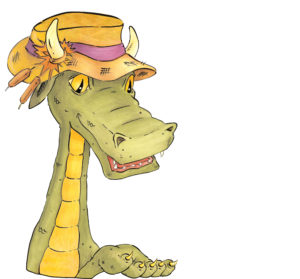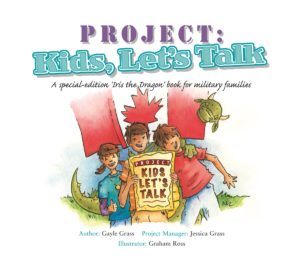Once upon a time….
by Iris Winston
Perth resident Gayle Grass began her journey with a friendly dragon some 24 years ago as a way to help her son, Trevor.
 Then 18 and in his first year of university at Queen’s in Kingston, Trevor was suffering from mental health issues. While he began treatment at the Royal Ottawa Hospital, Gayle searched for community programs. She also joined the board of the Ottawa Carleton Schizophrenia Society and other groups dealing with mental illness to address things from another perspective.
Then 18 and in his first year of university at Queen’s in Kingston, Trevor was suffering from mental health issues. While he began treatment at the Royal Ottawa Hospital, Gayle searched for community programs. She also joined the board of the Ottawa Carleton Schizophrenia Society and other groups dealing with mental illness to address things from another perspective.
“What I found hardest of all was the lack of knowledge and understanding and the tremendous stigma [associated with mental health],” she says. “At that time, no one came to your aid and you were really lost searching for answers. One thing that really upset me was that the main emphasis was on talking about the later stages of mental health challenges and the tragedies involved.
“My view was that this approach wouldn’t lessen the stigma,” she continues. “Surely it is better to concentrate on the person, all their good aspects and their hopes and dreams?”
With this in mind, she drew on her academic training, particularly an arts course she had taken while living in England that focused on poetry, printing and children’s books written in the Victorian period.
She points out that many of those books were significant in changing behaviour and attitudes. One text, The Uses of Enchantment: The Meaning and Importance of Fairy Tales, tells how the stories spoke to children in language they could understand and also helped them “express the inner self.”
 That was her motivation for writing her own stories to help young people—especially Trevor. Enter Iris the Dragon.
That was her motivation for writing her own stories to help young people—especially Trevor. Enter Iris the Dragon.
“I sat down one day and started writing,” she says. “I chose the dragon—an image I had always been drawn to when I was a child—as a fairy godmother type who lived under a bridge on a riverbank. The bridge represented crossing to achieve your dreams. The river represented challenging barriers but also connecting to the rest of the world.”
She chose to name the dragon Iris — the emblem of the Schizophrenia Society of Canada — because “through the ages, the Iris flower has been regarded as a symbol for faith, hope and courage.”
With the help of a friend as the illustrator, Gayle produced her first children’s book, written from the perspective of a child with a mental health issue. Each of the eight books produced over the last two decades covered different issues, such as anxiety disorder, bipolar disorder, ADHD (attention deficit hyperactivity disorder) and Asperger’s syndrome. There is even a book (commissioned by the Canadian Armed Forces) on the stress children suffer through military life and frequent moves. The next book in the series, due out in fall 2024, is a story of a child dealing with a grandparent who has Alzheimer’s disease.

Each story is presented from the child’s perspective and begins with an encounter between the child and the friendly dragon, who teaches them how to understand what they feel.
“Iris the Dragon always offers a solution,” says Gayle.
She also had to find a solution at the beginning of her project, after being rejected by established publishers. That turned out to be self-publishing, followed, more recently, by electronic publishing and printing on demand.
As an offshoot of the original project, learning software has been developed. Funded by government grants, it is proving popular with educators. The Iris the Dragon books are available across the English-speaking world free of charge.
“The object is to give children with mental health issues someone they can identify with through the stories, and help them understand what they are feeling,” says Gayle.
That was certainly the result for Trevor, the protagonist in her first book.
“Trevor is living a very productive life with the care and support of family, friends and the community,” she says. “You would not know he suffers from an illness. He works part-time, works out at the gym, takes courses online and is a great help with chores and helping others. The main point is that with the proper support, we can all thrive.”
For details about Iris the Dragon books, visit iristhedragon.org.






